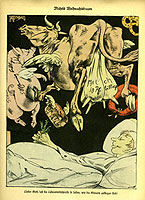Schrift: größer/kleiner
Inhaltsverzeichnis
Sie sind hier: WirRheinländer > english version > Weimar Republic, Nazi Dictatorship and Second World War (1919 - 1945)
Weimar Republic, Nazi Dictatorship and Second World War (1919 - 1945)
1918 - 1933
The Weimar Republic: Democracy and Downfall
The Weimar Republic began under a bad sign: the war-weary people took their protest onto the streets. At the end of the First World War, the German Empire was also finished. With the abdication of Wilhelm II and the transfer of government business to the socialist SPD, the strongest party in the Reichstag parliament, the change-over from monarchy to a democratic State happened overnight, as it were. This was not caused by a victorious revolution, but by the demands of opponents to the war for different negotiating partners than the imperial generals. The defeat in the war and its consequences were a burden which the Weimar Republic had to carry. The proclamation of the conditions for peace in the Treaty of Versailles was a shock for the nation. They were dictated to the underdog, negotiations were ruled out. It was the military, who had nurtured false hopes of victory until the end, who then circulated the "back-stabbing myth": the army had remained "undefeated in the field", only the revolution at home was to blame for Germany's defeat. In this way the political atmosphere of the Weimar Republic was poisoned from the start. Political forces of the left and right both wanted to break up the young republic again. Democracy without democrats was the bitter but true saying at the time. The Communists felt betrayed by the Social Democrats and agitated accordingly. And the old élites of the Kaiser's Empire, who wanted the reinstatement of the monarchy, remained in the decisive positions in the administration, the army and the economy. The first attempt at a democratic State on German soil did not augur well from the very beginning.
In the years until 1923, the Republic was repeatedly endangered by uprisings on the left and putsch attempts on the right, on the verge of civil war. The occupation by the French Army of areas on the right of the Rhine in 1923 set off the so-called Ruhrkampf, in which the population of the Ruhr region put up passive resistance. The occupied areas were supported by the central government until the total collapse of the currency. The attempt by Rhenish separatists, under the protection of the occupying forces, to break the Rhineland away from German territory was a further source of agitation.
These almost chaotic circumstances were followed in the Stresemann era by a phase of consolidation, during which the Chancellor managed to stabilize the currency and achieve foreign policy success. The Dawes Plan brought new, improved conditions for Germany to pay reparations. With the Treaty of Locarno and its membership of the League of Nations, Germany was once again an equal partner with the same rights as the European Great Powers. However, this important break-through in foreign policy was not followed by any change in the unstable conditions in the interior. Nevertheless, that era in which the economy began to recover somewhat, was perceived by the population as the "Golden Twenties", during which culture and science flourished.

In 1929 with the beginning of the world economic crisis, basic conditions deteriorated dramatically: the generally worsening economic situation was aggravated by increasing numbers of unemployed. In that situation the democratic foundations began to disintegrate. From 1930 no agreement could be reached between the parties in the Reichstag, which is why the Reich President von Hindenburg appointed the Chancellor and his Cabinet without the participation of Parliament. When the so-called presidial cabinets began, in which the government depended solely on the confidence of the head of state, the parliamentary democracy of the Weimar Republic had ceased to exist. Resistance to the take-over of power by the National Socialists (Nazis) was accordingly feeble.


